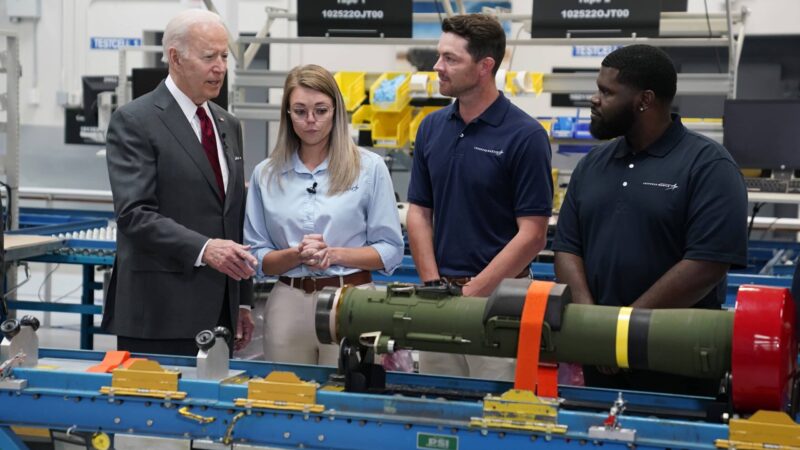Biden visits Alabama Lockheed plant as weapons stockpile strained
President Joe Biden speaks during tour of the Lockheed Martin Pike County Operations facility where Javelin anti-tank missiles are manufactured, Tuesday, May 3, 2022, in Troy, Ala.
By Aamer Madhani and Ben Fox, Associated Press
TROY, Ala. (AP) — President Joe Biden on Tuesday credited the assembly line workers at a Javelin missile plant for doing lifesaving work in building the antitank weapons that are being sent to Ukraine to stifle Russia’s invasion as he made a pitch for Congress to approve $33 billion so the U.S. can continue to hustle aid to the front lines.
“You’re allowing the Ukrainians to defend themselves,” Biden told the workers, his podium flanked by Javelin missile launchers and shipping containers. “And, quite frankly, they’re making fools of the Russian military in many instances.”
The president toured the Lockheed Martin factory in Alabama and said Ukrainian parents are naming their children “Javelin” or “Javelina” because of the weapons’ successes.
“Every worker in this facility and every American taxpayer is directly contributing to the case for freedom,” Biden said.
The president’s visit also drew attention to a growing concern as the war drags on: Can the U.S. sustain the cadence in shipping vast amounts of arms to Ukraine while maintaining a healthy stockpile it may need if conflict erupts with North Korea, Iran or elsewhere?
The U.S. has provided at least 7,000 Javelins, including some transferred during the Trump administration, or about one-third of its stockpile, to Ukraine in recent years, according to an analysis by Mark Cancian, a senior adviser with the Center for Strategic and International Studies international security program. The Biden administration says it has committed to sending 5,500 Javelins to Ukraine since the Feb. 24 invasion.
Analysts also estimate that the United States has sent about one-quarter of its stockpile of shoulder-fired Stinger missiles to Ukraine. Raytheon Technologies CEO Greg Hayes told investors last week during a quarterly call that his company, which makes the weapons system, wouldn’t be able to ramp up production until next year, due to parts shortages.
“Could this be a problem? The short answer is, ‘Probably, yes,’” said Cancian, a retired Marine colonel and former Office of Management and Budget specialist on Pentagon budget strategy, war funding and procurement programs.
He added that Stingers and Javelins were where “we’re seeing the most significant inventory issues” and that production of both weapons systems has been limited in recent years.
The Russian invasion offers the U.S. and European defense industry a big opportunity to bolster profits as lawmakers from Washington to Warsaw are primed to increase defense spending in response to Russian aggression. Defense contractors, however, face the same supply chain and labor shortage challenges that other manufacturers are facing, along with some others that are specific to the industry.
Biden noted that each Javelin produced requires 200 computer chips, but semiconductors are in short supply and limiting the availability of everything from autos to kitchen appliances. Biden is urging that legislation be approved to fund the manufacturing of computer chips in the U.S., though that is a longer-term fix to immediate pressures that militaries, businesses and consumers face now.
The war will mean increased sales for some defense contractors, including Raytheon, which makes the Stinger missiles that Ukrainian troops have used to knock out Russian aircraft. The company is also part of a joint venture with Lockheed Martin that makes the Javelins.
Lockheed Martin’s facility in Troy, Alabama has the capacity to manufacture about 2,100 Javelins per year. Biden’s trip overlapped with his push for an additional $33 billion in security and economic assistance for Kyiv. Senate Majority Leader Chuck Schumer, D-N.Y., said Monday he hoped quick bipartisan agreement on the security package could be reached so the Senate could begin considering it “as early as next week.”
Pentagon press secretary John Kirby said Monday that America’s military readiness is not dependent on one system. He said that every time the Pentagon develops a package of weapons and systems to send to Ukraine, the chairman of the Joint Chiefs of Staff and the department do an assessment on what the impact will be on readiness.
“It’s not about counting, say, Javelins and being able to say that when you reach a certain level then all your readiness is gone,” Kirby said. “The Javelin is an anti-armor capability, so we judge it all as a conglomerate of what’s our ability to meet this particular mission set, realizing that a Javelin isn’t the only capability you have against armor.”
The lightweight but lethal Javelin has helped the Ukrainians inflict major damage on Russia’s larger and better-equipped military. As a result, the weapon has gained almost mythic regard, celebrated with a Javelin song and images of Mary Magdalene carrying a Javelin becoming a meme in Ukraine.
Lockheed Martin CEO James Taiclet said in a recent CNBC interview that demand for the Javelin and other weapon systems would increase broadly over time because of the Russian invasion. He said the company was working “to get our supply chain ramped up.”
“We have the ability to meet current production demands, are investing in increased capacity and are exploring ways to further increase production as needed,” Lockheed Martin, which is based in Bethesda, Maryland, said in a statement.
1960s pop star Connie Francis has died. The singer’s life was touched by tragedies
1960s pop star Connie Francis has died. The first female singer to chart a number-one single on the Billboard Hot 100, she sold over 40 million records before the age of 25.
Marc Maron on why it’s time for his ‘WTF’ podcast to end
Marc Maron is proud of his run as host of his podcast, WTF. And because of that, he's bringing it to a close. He wants to avoid it becoming just another show "feeding the garbage bin of content."
Virginia is for … data centers? Residents are increasingly saying no
The world's highest concentration of data centers is in Virginia. Many residents are not happy about that.
Senate approves cuts to NPR, PBS and foreign aid programs
The Senate voted to approve a $9 billion rescission package aimed at clawing back money already allocated for public radio and television.
Gulf Coast braces for flooding as storm builds into possible tropical depression
The weather system moving across the Florida Panhandle on Wednesday was showing a greater chance of becoming a tropical depression as it moves toward the northern Gulf Coast.
White House says U.S. fentanyl overdose programs will be funded ‘in increments’
CDC staffers worry $140 million in grants could fail to reach state and local overdose programs. The White House officials say the dollars will arrive but won't say when.







